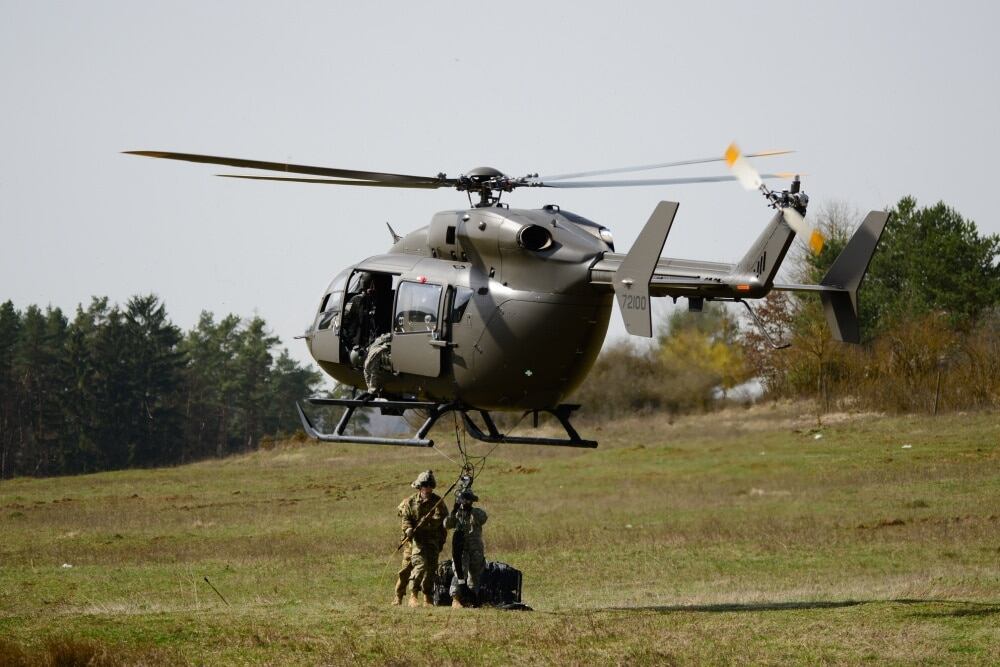WASHINGTON — Leonardo has withdrawn its latest lawsuit against the U.S. Army over the service’s decision to buy Lakota helicopters from Airbus without holding a competition, according to Leonardo.
AgustaWestland, a Leonardo subsidiary, filed a lawsuit two years ago in the U.S. Court of Federal Claims over a standard sources-sought notice that the Army issued, seeking those capable of building a lot of 16 LUH-72A Lakota helicopters for its training fleet. AgustaWestland contended the decision unfairly restricted competition.
The court ruled in favor of AgustaWestland, and the Army was barred from buying the 16 Lakotas. But the U.S. Court of Appeals overturned the lower court’s decision last month.
Prior to the appellate court’s decision, the Army decided to take first steps toward buying more Lakota helicopters by issuing another sources-sought notice to industry on Jan. 4 for 35 Lakotas using funding from a different fiscal year.
Days prior to the appellate court’s ruling, Leonardo filed a lawsuit again in the federal court on Jan. 22, this time over the Army’s new plan to buy more helicopters.
“In light of the Appellate Court ruling, Leonardo Helicopters has decided to discontinue any further legal action regarding the sole-source award of trainer helicopters to the U.S. Army,” the company said in a Feb. 12 statement. “We nonetheless continue to believe that strong competition for the government programs is in the best interests of our war fighters, American taxpayers and the U.S. defense industrial base. Of course, we are disappointed that there was no competition in this case.”
The legal battle stems from an Army decision, triggered from major budget cuts under sequestration, to restructure its aviation assets. In 2013, the service came up with the Aviation Restructure Initiative, or ARI, which retired the OH-58 Kiowa Warrior helicopter and the Army’s TH-67 single-engine basic rotary wing training helicopter. As part of the ARI, the Army decided to take dual-engine Lakotas already in inventory and repurpose them as the new designated trainer.
Several companies like Bell Helicopter and AgustaWestland were hoping at the time to sell military training helicopters to several services including the Army.
RELATED

While the Army originally intended to use only what was already in inventory, part of the ARI plan was to move 100 Lakotas from the National Guard and into the training fleet. The Guard pushed back, and so the Army decided to let it keep its Lakotas and purchase more from Airbus ― the helicopter’s manufacturer ― for the training fleet.
AgustaWestland sued the U.S. Army in September 2014, filing a premature complaint. It argued that the new role as trainer for the Lakota exceeded the scope of the original 2006 contract with Airbus that restricted competition.
The company also argued that the Army failed to develop an adequate plan for acquisition for a training helicopter.
The court rendered its opinion in August, issuing injunctive relief for AgustaWestland, meaning the Army could not move forward with its planned helicopter purchase.
When AgustaWestland filed its second lawsuit over the Army’s most recent sources-sought notice and had not withdrawn it by Jan. 30, days after the appellate court overturned the lower court’s decision, Airbus accused Leonardo of playing dirty.
“The [Department of Defense] acquisition system, with its own set of challenges, is under attack by a company that seems to think it has nothing to lose. And if they succeed, it will constitute a credible threat to every major player in the U.S. defense industry,” Chris Emerson, president of Airbus Helicopters, told a group of reporters in a phone call.
Emerson said he believed AgustaWestland’s new lawsuit used the same legal arguments and reasoning as the previous case, now for the new buy using FY17 funding. “The appellate ruling makes it clear that they can have no possible chance of winning it, so why pursue the lawsuit? I’m sorry to say this, but there is only one possible explanation.”
“If they had won the lawsuit, they would have just prevented the Army from meeting its readiness needs, but it would not have forced the Army to have procured Leonardo products,” Emerson said.
Leonardo did not say when it decided to withdraw its lawsuit or what motivated the decision.
Jen Judson is an award-winning journalist covering land warfare for Defense News. She has also worked for Politico and Inside Defense. She holds a Master of Science degree in journalism from Boston University and a Bachelor of Arts degree from Kenyon College.








